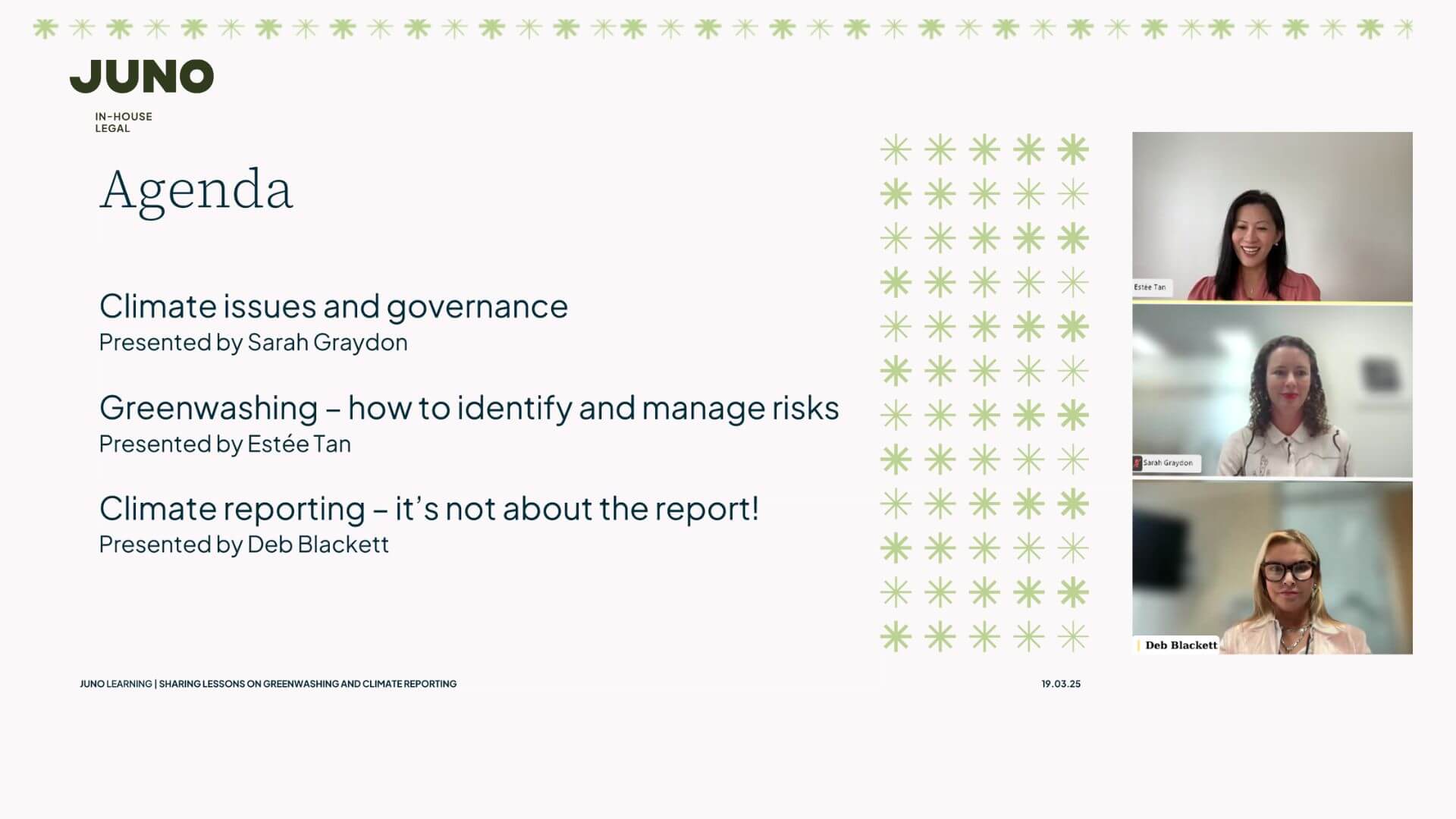
Recently, we had the privilege of hosting a Juno Learning online CPD session on greenwashing and climate reporting. With regulatory expectations evolving and international trends shifting, in-house legal teams are on the front line of managing these risks.
Ngā mihi nui to our speakers, Juno Lawyers Sarah Graydon, Estée Tan, and Deb Blackett, for sharing their expertise, and to everyone who joined for their thoughtful engagement.
Estée has generously captured the key takeaways for the in-house community, from a presentation and discussion that was both timely and practical.
A practical update for in-house lawyers on climate reporting and greenwashing
Climate reporting and greenwashing risk continue to be major considerations for businesses operating in New Zealand. With regulatory expectations evolving and international trends shifting, in-house legal teams are on the front line of managing these risks.
Alongside Sarah Graydon and Deb Blackett, I had the opportunity to share insights on what legal teams should be thinking about—from climate reporting obligations to identifying and mitigating greenwashing risks.
The Governance Challenge: Climate risk and board responsibilities

Juno Legal
Presented by Sarah Graydon
Sarah gave us some insight into what boards of organisations are likely to be thinking about and how they view climate change issues, and the key takeaways for in-house lawyers. In her experience, there is now a firm acceptance by governance bodies that climate risk should be integrated into decision-making and strategy. Given the Companies Act reforms, it is likely board members would look to in-house lawyers for their guidance around director duties.
Key takeaways for in-house legal teams:
✔ Boards rely on in-house lawyers for guidance. Legal teams play a key advisory role in interpreting director obligations, compliance requirements, and how climate risks impact decision-making.
✔ Climate risk isn't just an ESG issue—it’s a financial risk. Boards need to think beyond compliance and embed climate-related risks into financial and strategic planning.
✔ Forward-looking risk management is critical. Companies need to move from backward-looking risk assessments to proactive scenario planning, ensuring they can adapt to future climate-related disruptions.
💡 Engagement highlight: One participant raised an insightful point about whether New Zealand’s climate governance expectations will shift in response to global rollbacks on ESG regulations, a timely reminder that businesses need to stay agile.
👉 Key question for legal teams: Is our board treating climate risk as an essential part of business strategy, or is it being sidelined as a compliance issue?
Greenwashing: The legal risks and how to manage them

Juno Legal
Presented by Estée Tan
Many businesses genuinely want to showcase their sustainability efforts, but well-intended claims can still be misleading if they aren’t carefully managed. Under New Zealand’s Fair Trading Act, misleading or deceptive environmental claims - whether intentional or not - can result in regulatory action.
What in-house lawyers should do:
✔ Be cautious with broad claims. Terms like “green,” “eco-friendly,” or “sustainable” can be misleading if they aren’t backed by measurable, independent evidence.
✔ Audit public statements. Review past and present sustainability claims across websites, advertisements, reports, and packaging. Ensure claims are specific and substantiated.
✔ Monitor enforcement trends and be on top of climate litigation trends abroad and domestically. In New Zealand, the Commerce Commission and Financial Markets Authority are the main regulatory bodies, but there are also greenwashing claims issued by non-profit organisations such as Greenpeace and Consumer NZ against businesses. Furthermore, there are rollbacks in some countries and by some organisations in their ESG goals. Consider how that affects greenwashing enforcement in New Zealand.
💡 Engagement highlight: A lively discussion in the Q&A explored how in-house lawyers can balance the risks of greenwashing while still backing their company’s sustainability messaging, a key challenge in an era of ESG backlash and greenhushing.
👉 Key question for legal teams: Do you have a structured process for reviewing and approving environmental claims before they go public?

Juno Legal
Climate Reporting: More than a compliance exercise
Presented by Deb Blackett
Climate disclosures are now a financial reporting obligation, not just a sustainability exercise. Many organisations are still treating reporting as a box-ticking exercise, but legal teams have a critical role in ensuring climate-related commitments are linked to business strategy and financial planning.
Key legal considerations for in-house lawyers:
✔ Scenario planning matters. Companies should be stress-testing how climate-related risks (regulatory shifts, physical climate changes, investor expectations) will impact their business model, supply chain, and financial resilience.
✔ Legal risk in contracts. ESG-related obligations are increasingly appearing in contracts, particularly in cross-border agreements. Companies should ensure they aren’t overcommitting to targets they can’t meet.
✔ Greenhushing is on the rise. Some businesses are choosing not to talk about their sustainability efforts out of fear of scrutiny. While caution is understandable, legal teams should support clear, evidence-based disclosures rather than avoiding the conversation altogether.
💡 Engagement highlight: One participant, who recently returned from the UK, shared that contractual ESG obligations are becoming more common overseas - raising the question of whether similar compliance requirements will increase in New Zealand contracts.
👉 Key question for legal teams: Are our climate disclosures integrated into business strategy, or are they being treated as a box-ticking exercise?
Final thoughts
As we heard from my co-presenters, embedding sustainability into business operations and strategy is key to the success of climate reporting and meeting ESG goals.
The engagement in this session was fantastic, with a wide range of perspectives offered, including whether global trends will embolden or suppress sustainability efforts in New Zealand.
Thanks to everyone who joined the session and for the thoughtful questions and comments - especially around contractual obligations, board responsibilities, and international trends in climate risk management.
Ngā mihi nui to Sarah Graydon, Estée Tan, and Deb Blackett for sharing their energy and expertise and to everyone who joined and contributed to the discussion.
It’s a privilege to connect with our in-house legal community.
And because we love sharing, here are some further resources for you:
Watch the recording. Available on our website in News and Resources.
Quiz yourself. Try our Juno self-assessed quiz to revise and reflect on the session.
If you have any questions or ideas, we’d love to hear from you. Contact Juno Learning with suggestions, feedback, or topics you'd like to see covered in future sessions.